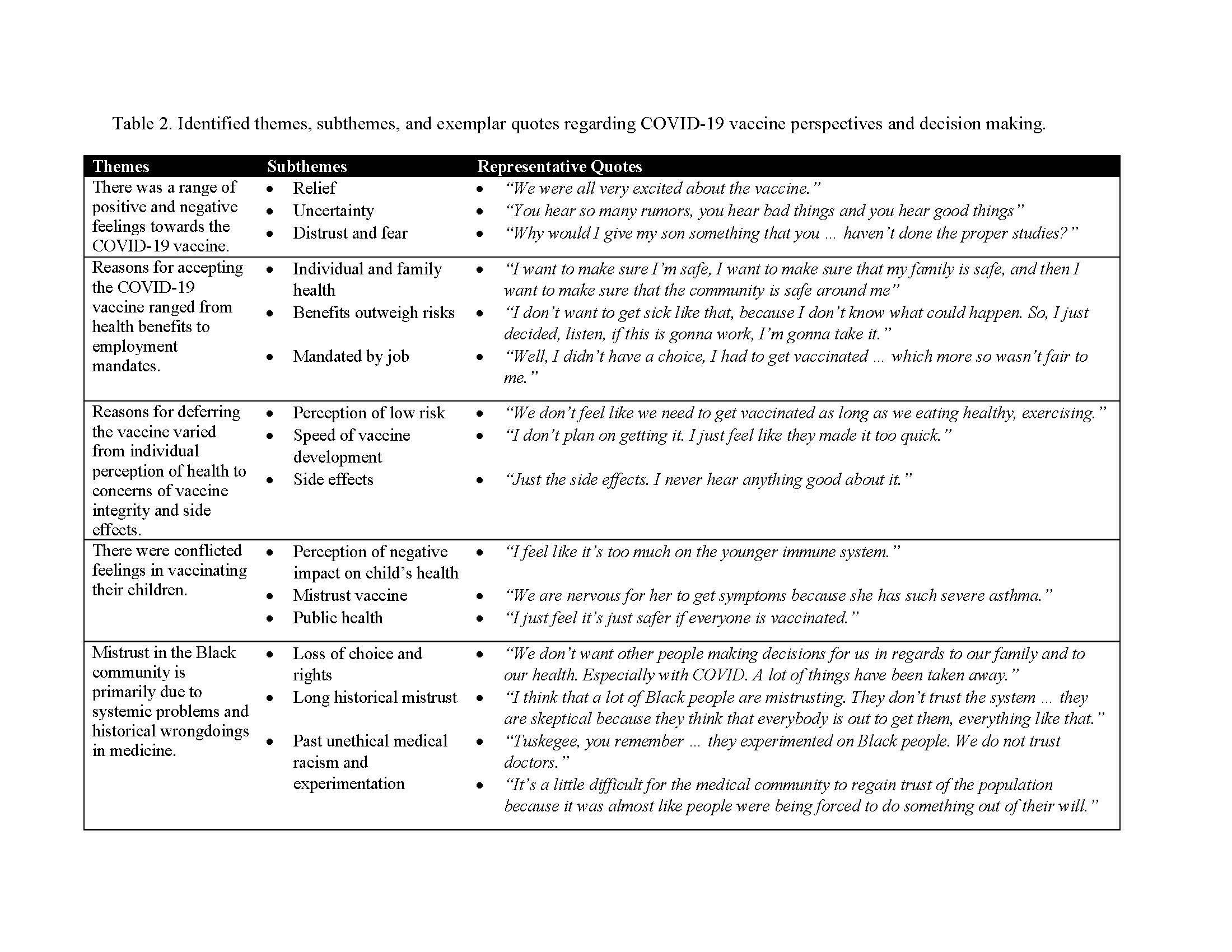Immunizations/Delivery
Category: Abstract Submission
Immunizations/Delivery II
511 - “Black is not monolithic,” reaffirming complexities around COVID-19 vaccine decision making among Black parents
Sunday, April 24, 2022
3:30 PM - 6:00 PM US MT
Poster Number: 511
Publication Number: 511.326
Publication Number: 511.326
Megan Wu, Yale-New Haven Children's Hospital, Chapel Hill, NC, United States; Jaspreet Loyal, Yale School of Medicine, New Haven, CT, United States; Kristin Reese, Yale-New Haven Children's Hospital, New Haven, CT, United States; Kathleen M. Felisca, Yale-New Haven Children's Hospital, New Haven, CT, United States; John Havlik, Yale School of Medicine, New Haven, CT, United States
.jpg)
Megan Wu
Undergraduate Student
Yale College
Chapel Hill, North Carolina, United States
Presenting Author(s)
Background: Longstanding inequities in the US have resulted in the disproportional impact of COVID-19 on Black Americans. Coupled with medical mistrust, COVID-19 vaccine uptake is lower in Black populations.
Objective: To understand the perspectives of Black parents on the COVID-19 pandemic, the vaccine for themselves and their children, and trust with the medical community.
Design/Methods: Using qualitative methodology, we conducted in-depth semi-structured in-person interviews of Black parents of children admitted to the inpatient pediatric units in our tertiary academic medical center in Connecticut from July to November 2021. We used the grounded theory approach and the constant comparative method until saturation was reached.
Results: We interviewed 20 parents who identified as Black (Table 1). 50% of participants were vaccinated against COVID-19. The following 5 themes and subthemes emerged (see Table 2 for quotes):
(1) Perspectives on the COVID-19 vaccine ranged from much needed relief, feelings of uncertainty, distrust and fear.
(2) Participants chose to get the COVID-19 vaccine for their own and family’s health because they felt that the benefit outweighed the risk, or that the vaccination was mandated by their job.
(3) Participants who chose not to get the COVID-19 vaccine perceived themselves to be at low risk for COVID-19 infection, expressed concerns about the speed of vaccine development, and vaccine side effects.
(4) Participants were conflicted about the vaccine for their child.
(5) Participants shared that mistrust in the Black community is, in part, due to systemic problems and historical wrongdoings in medicine.Conclusion(s): We found a spectrum of beliefs and behaviors among Black parents with respect to the COVID-19 vaccine. Our findings provide an important reminder to not generalize the perspectives of any one community and provide insight into factors contributing to mistrust that the medical community must recognize.
pas-CV.pdf

Objective: To understand the perspectives of Black parents on the COVID-19 pandemic, the vaccine for themselves and their children, and trust with the medical community.
Design/Methods: Using qualitative methodology, we conducted in-depth semi-structured in-person interviews of Black parents of children admitted to the inpatient pediatric units in our tertiary academic medical center in Connecticut from July to November 2021. We used the grounded theory approach and the constant comparative method until saturation was reached.
Results: We interviewed 20 parents who identified as Black (Table 1). 50% of participants were vaccinated against COVID-19. The following 5 themes and subthemes emerged (see Table 2 for quotes):
(1) Perspectives on the COVID-19 vaccine ranged from much needed relief, feelings of uncertainty, distrust and fear.
(2) Participants chose to get the COVID-19 vaccine for their own and family’s health because they felt that the benefit outweighed the risk, or that the vaccination was mandated by their job.
(3) Participants who chose not to get the COVID-19 vaccine perceived themselves to be at low risk for COVID-19 infection, expressed concerns about the speed of vaccine development, and vaccine side effects.
(4) Participants were conflicted about the vaccine for their child.
(5) Participants shared that mistrust in the Black community is, in part, due to systemic problems and historical wrongdoings in medicine.Conclusion(s): We found a spectrum of beliefs and behaviors among Black parents with respect to the COVID-19 vaccine. Our findings provide an important reminder to not generalize the perspectives of any one community and provide insight into factors contributing to mistrust that the medical community must recognize.
pas-CV.pdf

